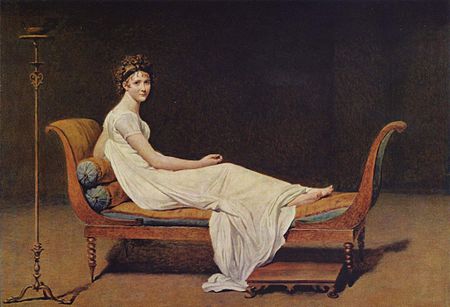 p 372 | William= German Emperor Wilhelm II.
p 372 | William= German Emperor Wilhelm II. p 373 | the Abbaye-aux-Bois: where the celebrated hostess Mme de Récamierher had her salon in Paris, at which, during the 1820s, the great Romantic writers, Chateaubriand among them, read their works in public.
p 373 | Émilie du Châtelet (1706-49), French mathematician, physicist, and author during the Age of Enlightenment, who had a long liaison with Voltaire.
p 373 | ... Roman Empress...: possibly Agrippina, wife of Claudius I and mother of Nero, famous for her domineering ways. (Sturrock)
p 373 |... like Christ or the Kaiser...: a reference to Christ's injunction in Matthew 10:37; and to Kaiser Wilhelm II's declarations of 1891 that "The will of the King is the supreme law" and that soldiers should obey "without a murmur" if ordered to fire on their own families. (Sturrock)
p 374 | "You alone did seem ...": "Toi seule me parus ce qu'on cherche toujours." (from Vigny)
p 378 | Pierre Potain (1825-1901), a prominent Paris medical man, with several literary patients
(see the Goncourts' Journal); Jean-Martin Charcot (1825-93), greatest of 19th-century neurologists in France, who influenced young Freud when he was a medical student in Paris.
p 380 |the comedies of Pierre de Marivaux (1688-1763) contain numerous aristocrats, but no baronnes. (Sturrock)
p 380 | Eugene Viollet-le-Duc (1814-79) was a champion of Gothic architecture, responsible for the restoration of many medieval buildings.
p 381 | "Charles-Maurice, Abbé of Perigord"=Talleyrand, both an unbeliever and a Catholic bishop.
p 384 | Vincent d'Indy (1851-1931), composer & teacher, was outspokenly anti-Dreyfus, and also anti-Semitic. The position of Claude Debussy (1862-1918) was more nuanced; ironically, the fiercely partisan disagreements as to the merits or otherwise of his opera, Pelléas et Mélisande , caused it later to be likened to the Dreyfus Affair.
.jpg/200px-Moli%C3%A8re_-_Nicolas_Mignard_(1658).jpg) |
| Molière |
p 387 | Henri Meilhac (1831-97) wrote plays and comic operas, the best-known of which is La belle Hélène. Brichot is referring to Pascal's famous pensée: "If Cleopatra's nose had been shorter, the whole face of the earth would have been changed." (Sturrock)
p 393 | Jean-Baptiste Poquelin was the real name of Molière, whose absurd character Argan, in Le malade imaginaire, is the model for Proust's pastiche of medical jargon. Mr. Purgon, a character from the same play. (Sturrock)
p 387 | "Uncle, I mean Sarcey": Francisque Sarcey (1827-99) was the leading drama critic of the day, nicknamed "Uncle" for his good sense and middlebrow tastes. (Sturrock)
p 397 | Phineas Taylor Barnum (1810-91), the archetypal American showman and publicist.
